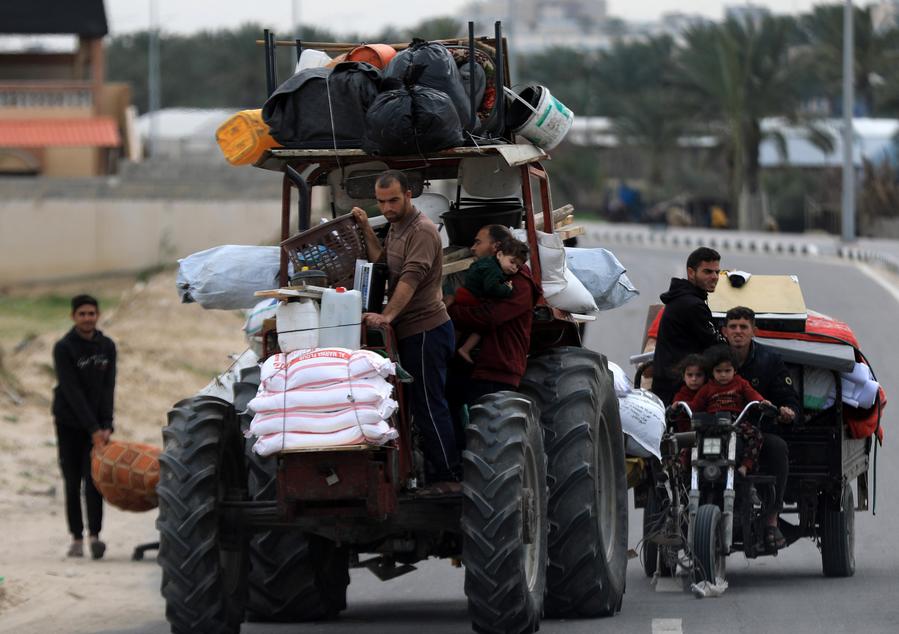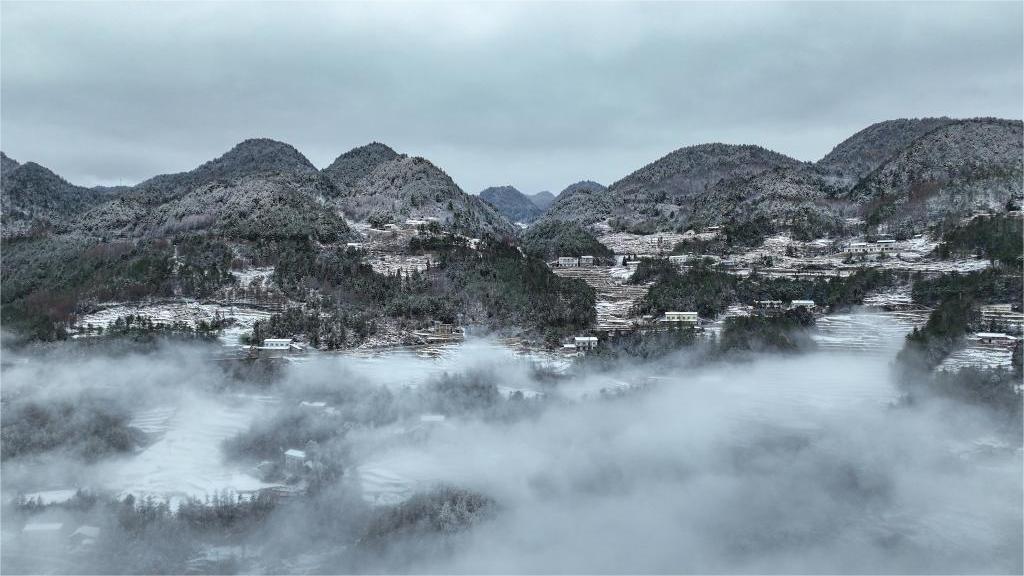Explainer: What to know about Israel's imminent Rafah assault and global opinion

People leave their homes after Israeli bombings in the southern Gaza Strip city of Rafah, on Feb. 13, 2024. (Photo by Yasser Qudih/Xinhua)
The international community has widely criticized the Israeli intention to invade Rafah.
JERUSALEM, Feb. 18 (Xinhua) -- Over the past few weeks, Israel has signaled its intention to conduct a ground operation in Rafah, Gaza's southernmost town, to "eliminate" Hamas and rescue Israeli hostages. The impending invasion has deeply concerned the international community. Several countries have spoken out against it, warning of a humanitarian catastrophe in the coastal enclave.
Since the onset of the latest escalation in the conflict between Israel and Hamas, Israel has been urging civilians in the Strip to evacuate to safe areas in southern Gaza, as its military operation began in the northern part of the Strip. As a result, more than one million people, or more than half of Gaza's total population, poured into Rafah to seek shelter, most living in tents.
But Rafah could soon become a battlefield. Israeli army and special forces jointly raided Rafah on Monday morning and rescued two hostages who were abducted by Hamas on Oct. 7, 2023, which was seen as a rehearsal for ground invasion.
Israel has vowed to fight against Hamas until "all goals" -- eliminating Hamas, releasing all hostages and ensuring that Gaza doesn't pose a threat to Israel anymore -- are achieved. Israeli Prime Minister Benjamin Netanyahu announced earlier this month that it's impossible to achieve these goals "by leaving four Hamas battalions in Rafah," calling on the Israel Defense Forces and security agencies to formulate a plan for ground operations in Gaza's southernmost town.
Israel's Wartime Cabinet Minister Benny Gantz also warned on Friday that the fighting would continue during Ramadan -- the Islamic holy month of fasting, which starts on March 10 this year -- if the hostages are not returned.

A boy sells goods beside the ruins in the southern Gaza Strip city of Rafah, Feb. 17, 2024. (Photo by Yasser Qudih/Xinhua)
Israel will keep in touch with Egypt, which borders Rafah, and other countries and evacuate residents in Rafah before launching ground operations into the city, according to Gantz.
The international community has widely criticized the Israeli intention to invade Rafah. The UN Office for the Coordination of Humanitarian Affairs warned that "indiscriminate bombing of densely populated areas may amount to war crimes" under international humanitarian law.
Regional countries, including Egypt, Saudi Arabia, the United Arab Emirates, Qatar and Bahrain, voiced deep concern over the potential invasion on Monday.
Egypt's State Information Service stressed in a statement on Friday that Egypt rejects any forced or voluntary displacement of Palestinians from the Gaza Strip to its outside, especially to Egyptian territories.
A military action in Rafah "would worsen an already catastrophic humanitarian situation and prevent the urgently needed provision of basic services and humanitarian assistance," Josep Borrell, the EU's high representative for foreign affairs and security policy, said in a statement on Friday.
During a joint press conference on Friday with Jordanian King Abdullah II, French President Emmanuel Macron warned against a forced and massive displacement of the population, which would be another serious violation of international law and pose a significant risk for regional escalation. An Israeli military offensive in Rafah would be a "turning point" for the conflict in Gaza, said Macron.
German Foreign Minister Annalena Baerbock, who just visited Israel this week to push for a ceasefire in Gaza, said the enclave is on the "brink of collapse" due to the humanitarian situation. People in Rafah "cannot simply vanish into thin air," she said.
U.S. President Joe Biden, who had two phone calls with Netanyahu in the past week, told reporters on Friday that he had urged Netanyahu to protect civilians in the planned operation in Rafah while "hoping that the Israelis will not make any massive land invasion." U.S. Vice President Kamala Harris also told Israeli President Issac Herzog on the sidelines of the ongoing Munich Security Conference that her country opposes a military operation in Rafah without a credible and executable plan to ensure the safety of civilians there.
However, despite calling for a ceasefire in Gaza, the Biden administration is preparing to send a new package of weapons to Israel, which is estimated to be worth tens of millions of U.S. dollars, according to a report by the Wall Street Journal on Saturday, citing anonymous U.S. officials.
Photos
Related Stories
- Hamas accuses Israel of obstructing efforts to reach ceasefire in Gaza
- France, Jordan call for two-state solution to Gaza conflict
- Two-state solution for lasting peace highlighted in Munich
- Türkiye, Egypt to enhance cooperation, promote peace in Gaza: Erdogan
- Chinese FM spokesperson's remarks on Israeli large-scale airstrikes in Gaza's Rafah
Copyright © 2024 People's Daily Online. All Rights Reserved.









